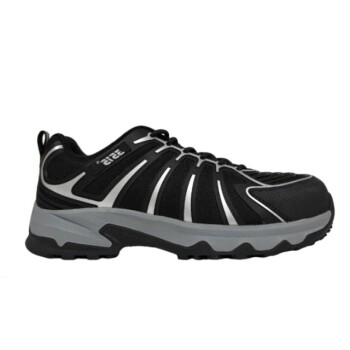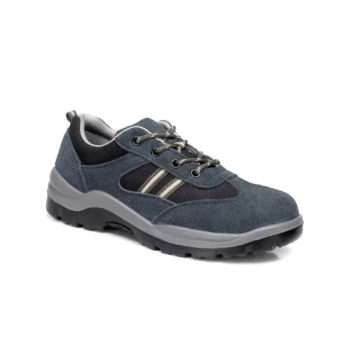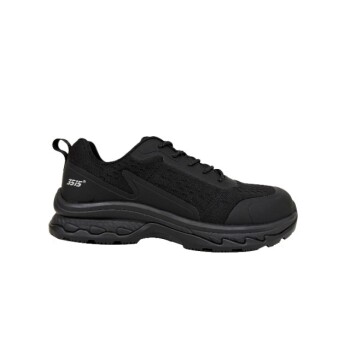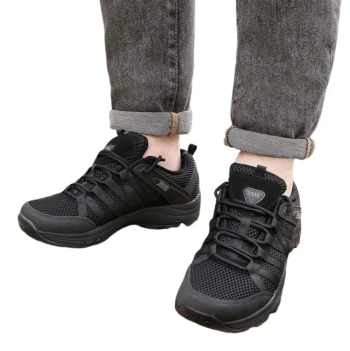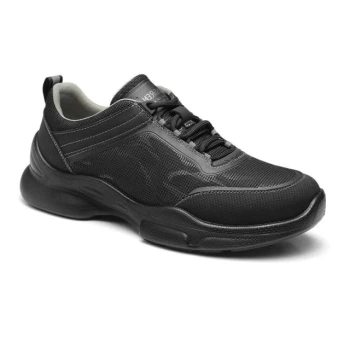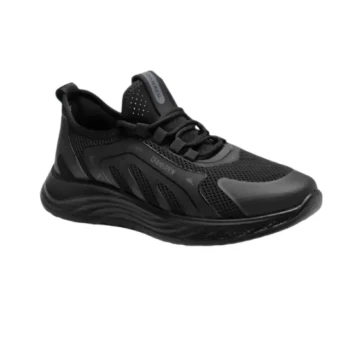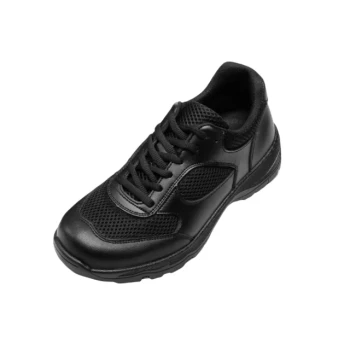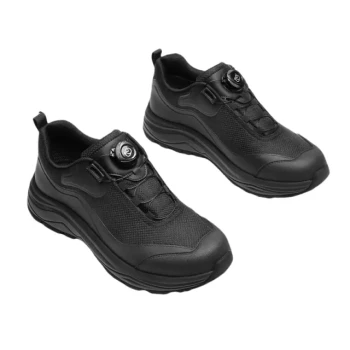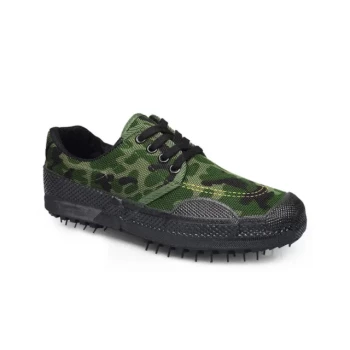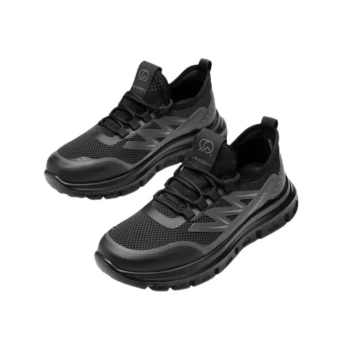In a work shoe, the material is not just a feature; it is the foundation of its performance. The materials chosen for the upper, midsole, and outsole directly dictate the shoe's safety, durability, comfort, and weight. This system of materials determines whether the footwear will protect you from hazards, support you through a long shift, or fail under pressure.
The optimal work shoe isn't defined by a single "best" material, but by a carefully engineered system. The upper, midsole, and outsole are each selected to meet the specific demands of your work environment for safety, comfort, and long-term durability.
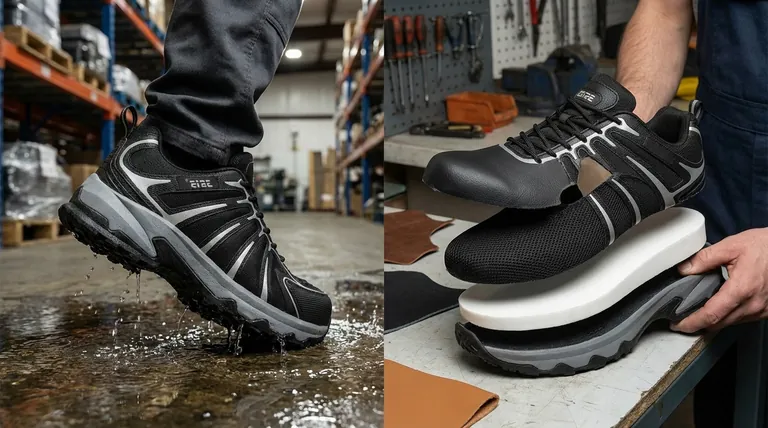
Deconstructing the Work Shoe: A Three-Part System
A work shoe is more than what you see on the surface. It’s an integrated system of three distinct layers, each with a specific job and made from materials chosen for that function.
The Upper: Your First Line of Defense
The upper is the part of the shoe that wraps around your foot. Its primary roles are protection and breathability.
Full-grain leather is the traditional choice, known for its exceptional durability and resistance to abrasion. It offers robust protection but is often heavier and less breathable.
Synthetic materials, such as breathable textiles, mesh, and Nubuck leather, offer a lighter and more flexible alternative. These are excellent for jobs requiring agility and for work in warmer climates.
Waterproof membranes can be bonded to either leather or synthetic uppers to provide protection from the elements while allowing some moisture to escape.
The Midsole: The Shock Absorber
The midsole is the critical layer of cushioning between your foot and the hard outsole. Its material choice directly impacts all-day comfort and reduces fatigue.
EVA (Ethylene Vinyl Acetate) is a foam-like material that is very lightweight and provides excellent cushioning. It’s ideal for roles that involve a great deal of walking or standing on hard surfaces.
PU (Polyurethane) is a denser and heavier foam. While it provides slightly less initial cushioning than EVA, it is significantly more durable and resistant to compression over time.
The Outsole: Your Connection to the Ground
The outsole makes direct contact with the ground, making its material vital for grip, stability, and wear resistance.
Rubber is the premier material for slip resistance. Its ability to provide superior traction makes it essential for environments like kitchens, hospitals, or industrial sites where floors may be wet or oily.
PU outsoles are also common, offering good durability and resistance to chemicals and oils, though they may not provide the same level of grip as specialized rubber compounds.
Understanding the Inevitable Trade-offs
Choosing the right material is always a balancing act. Understanding the inherent compromises is key to making an informed decision.
Durability vs. Weight
The most durable materials, like thick leather and dense rubber, invariably add weight to the shoe. This can increase fatigue over a long workday. Lighter synthetic options improve comfort but may not withstand harsh, abrasive environments for as long.
Breathability vs. Water-Resistance
A highly breathable mesh upper is perfect for a hot, dry warehouse but offers zero protection in the rain. Conversely, a fully waterproof boot will keep you dry but may trap sweat and heat, leading to discomfort in warm conditions.
Flexibility vs. Support
Lighter, more flexible materials allow for greater agility and a more natural foot movement. However, they often provide less structural support than a rigid, heavy-duty leather boot, which is critical for protecting the ankle on uneven terrain.
How to Choose the Right Material for Your Needs
Focus on the primary demands of your job to guide your selection.
- If your primary focus is maximum protection and durability: Opt for full-grain leather uppers paired with a dense rubber or polyurethane (PU) outsole.
- If your primary focus is all-day comfort and fatigue-reduction: Prioritize shoes with a lightweight synthetic upper and a thick EVA midsole for superior cushioning.
- If your primary focus is safety on slick or wet surfaces: Ensure the outsole is explicitly rated as slip-resistant rubber and consider an upper made of waterproof material.
By understanding how materials work together as a system, you can select a work shoe that functions as a true tool for your trade.
Summary Table:
| Component | Key Materials | Primary Function |
|---|---|---|
| Upper | Full-grain Leather, Synthetics (Mesh, Nubuck), Waterproof Membranes | Protection, Breathability, Weather Resistance |
| Midsole | EVA (Lightweight Cushioning), PU (Durable Support) | Shock Absorption, Fatigue Reduction |
| Outsole | Rubber (Superior Slip Resistance), PU (Chemical/Oil Resistance) | Traction, Stability, Wear Resistance |
Ready to equip your workforce with the right footwear?
As a large-scale manufacturer, 3515 produces a comprehensive range of safety and work footwear for distributors, brand owners, and bulk clients. Our production capabilities encompass all types of shoes and boots, engineered with the precise material systems discussed here to meet your specific safety and comfort requirements.
Contact 3515 today to discuss your project and get a quote. Let us help you provide durable, comfortable, and safe footwear solutions.
Visual Guide
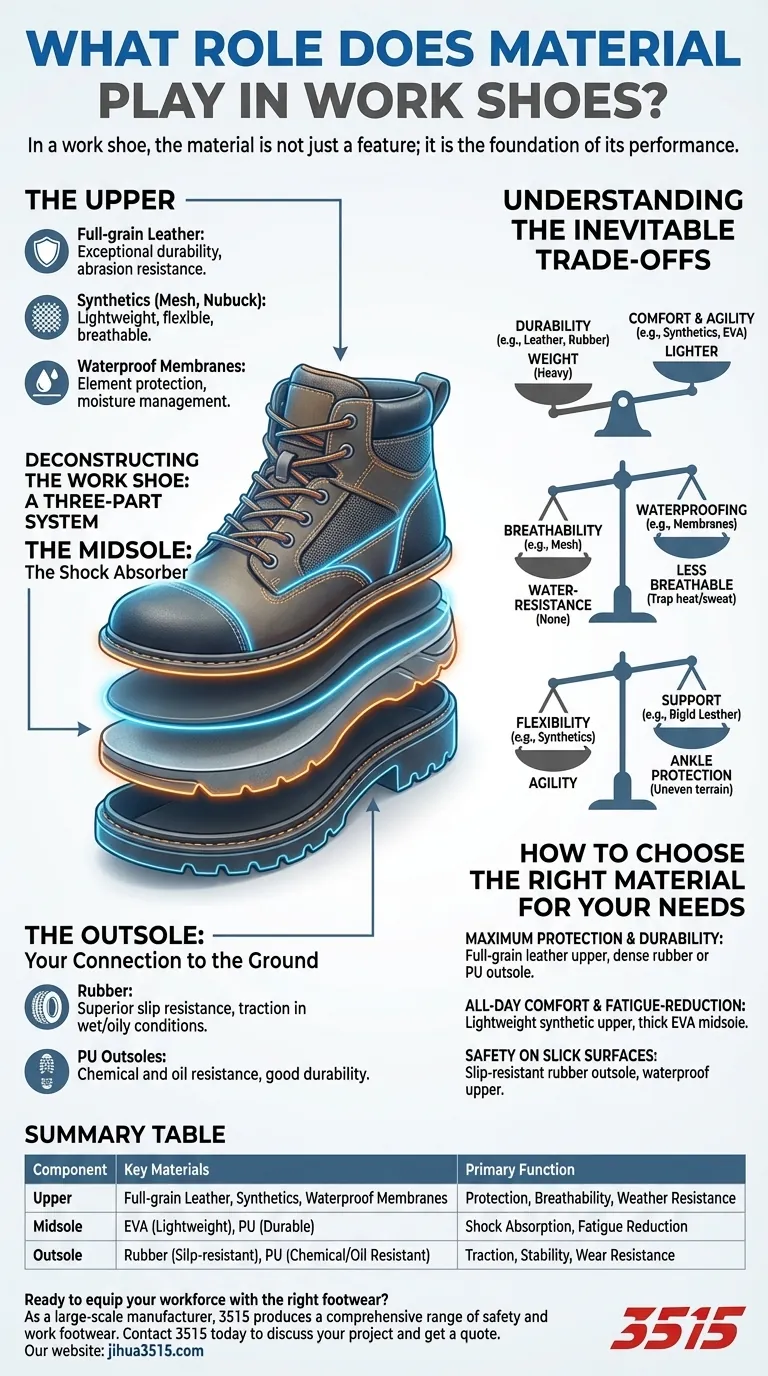
Related Products
- Premium KPU Athletic Safety Shoes for Wholesale
- Custom Safety Shoe Manufacturer for Wholesale & OEM Brands
- Premium Lightweight Safety Shoes for Wholesale & Bulk Orders
- Durable Rubber-Soled Utility Shoes for Wholesale & Custom Brand Manufacturing
- Lightweight Breathable Training Shoes for Wholesale & Custom OEM Manufacturing
People Also Ask
- Are there vegan firefighter boots available? Yes, NFPA-Certified & High-Performance
- What is the significance of scientific heel height design in protective footwear for maintaining foot health?
- How do safety shoes mitigate electrical hazards? A Guide to EH, SD, and CD Footwear
- Why do industrial-grade pressure-sensing insoles use a three-zone layout? Optimize Biomechanical Data Accuracy
- What are the functions of the lining material in safety footwear? Unlock All-Day Comfort & Performance
- What role do professional safety shoes play in mitigating risks during aviation maintenance on scaffolding? Ensure Worker Safety & Stability
- How do industrial-grade safety shoes contribute to reducing accident rates? 3 Ways to Cut Risk in Construction & Mining
- Why is high-specification safety footwear essential for protecting workers during waste management processes?
